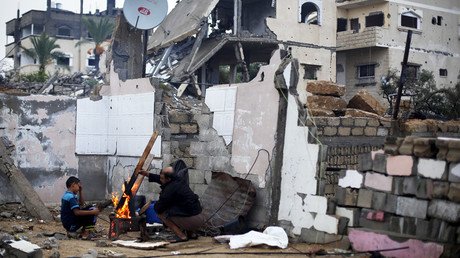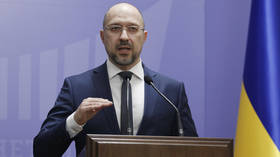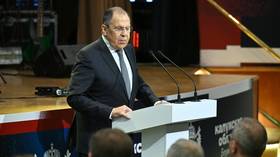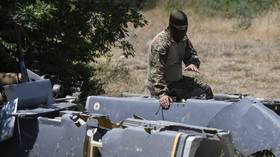UNSC passes resolution demanding end to Israeli settlement building on occupied Palestinian land
The UN Security Council has passed a resolution demanding an end to the construction of Israeli settlements on occupied Palestinian territories after the US abstained from voting.
The resolution was introduced to the UNSC by New Zealand, Malaysia, Venezuela and Senegal on Friday, a day after Egypt withdrew reportedly under pressure from Israel and US President-elect Donald Trump.
Earlier, Trump and Israeli authorities also called on the US to veto the resolution. The document was eventually adopted with 14 of 15 UNSC members voting in favor. The US was the only nation to abstain from voting.
As to the U.N., things will be different after Jan. 20th.
— Donald J. Trump (@realDonaldTrump) December 23, 2016
It is the first resolution passed by the UNSC on the Israeli-Palestinian conflict in almost eight years.
The Israeli envoy to the UN Danny Danon criticized the US' decision to abstain. However, he expressed his confidence that the new US president would “no doubt” usher in a new era in UN-Israeli ties, as well as the new UN Secretary General.
So much for the "unbreakable" bond between Israel and the US. President Obama today broke it.
— Ari Fleischer (@AriFleischer) December 23, 2016
The US Ambassador to the UN Samantha Power responded to the Israeli envoy’s criticism by stressing that one “cannot champion settlements and the two state solution” at the same time. She went on to say that the US did not veto the resolution as it “reflects the facts on the ground and is consistent with US policy.”
Power also stressed that continued settlement building “undermines” Israel’s own security.
“We’ve voted today in favor of the resolution draft on Israeli settlements, since it’s based on well-proven wording, which represents the joint opinion of the international community on Israel’s illegal settlement activities on the occupied Palestinian territories,” said Russia’s envoy to the UN Vitaly Churkin.
“The document condemns violent actions against the civilian population and terrorism acts, it urges both sides to bring the violence to the end and stop undermining and aggressive rhetoric … such actions undermine the perspectives of a two-state approach to the Palestinian question.”
Adoption of Resolution 2334 (14 yes, 1 abstention - USA) results in sustained applause in the Security Council chamber. https://t.co/RgvzCQQhZB
— United Nations (@UN) December 23, 2016
At the same time, Palestinians hailed the adoption of the resolution by the UNSC as a “day of victory.”
"This is a day of victory for international law, a victory for civilized language and negotiation and a total rejection of extremist forces in Israel," Chief Palestinian Negotiator Saeb Erekat told Reuters.
Nabil Abu Rdainah, spokesman for Palestinian President Mahmoud Abbas, told the official Palestinian news agency Wafa that the move was a blow to Israel.
"The Security Council resolution is a big blow to Israeli policy, a unanimous international condemnation of settlements and ... strong support for the two-state solution,” he said.
.@POTUS refusal to veto UN resolution against Israel is latest shameful chapter in Obama presidency. US has no stronger ally than Israel.
— Liz Cheney (@Liz_Cheney) December 23, 2016
Remember when Pres Obama said he had Israel's back? Israel, and many other nations, know how meaningless the President's words are.
— Ari Fleischer (@AriFleischer) December 23, 2016
Danon earlier said that the resolution served as “the condemnation of the sole democracy in the Middle East [Israel].”
The UNSC was initially scheduled to vote on the resolution on Thursday but Egypt pulled its text at the last minute, postponing the vote until after the wrapup of the Arab League ministerial meeting in Cairo. According to Israel's Haaretz newspaper, Prime Minister Benjamin Netanyahu exerted heavy pressure on Egyptian President Abdel Sissi urging him to delay the vote.
Netanyahu also urged the US to veto the vote on the "anti-Israel resolution” on Wednesday night in a short tweet.
The US should veto the anti-Israel resolution at the UN Security Council on Thursday.
— Benjamin Netanyahu (@netanyahu) December 22, 2016
Meanwhile, US House Speaker Paul Ryan denounced US abstention by calling it “absolutely shameful” and describing it as a “blow to peace.” The US Republican senator, John McCain, went further and said that the abstention in the UNSC vote made the US “complicit in this outrageous attack” against Israel, reported Reuters.
The current Obama administration previously expressed its disapproval of Israeli settlement policies, which Tel Aviv has pursued since 1967. However, in 2011, Washington vetoed a draft resolution condemning Israeli settlements.
Israel occupied Palestinian territories in 1967. Now, more than 500,000 Israelis live in settlements built on occupied territories. Meanwhile, Palestinians have been seeking full independence for the occupied territories for decades and demand full recognition as a sovereign state from both the UN and the international community.
The adoption of the document is an “important positive step” towards the resolution of the Israeli-Palestinian conflict, although it is only “a small one,” Miko Peled, an Israeli-American activist and author, told RT.
He also said that this move is clearly “a blow for Israeli diplomacy” that could even mean an end to Netanyahu's political career. Peled also described it as one of Obama's last “statements”. However, the resolution will hardly, in practice, stop the expansion of Israeli settlements in occupied territories as Israel treats them “like any other part of the Land of Israel and will not stop building,” especially after it receives the backing of the Trump administration, Peled said.














